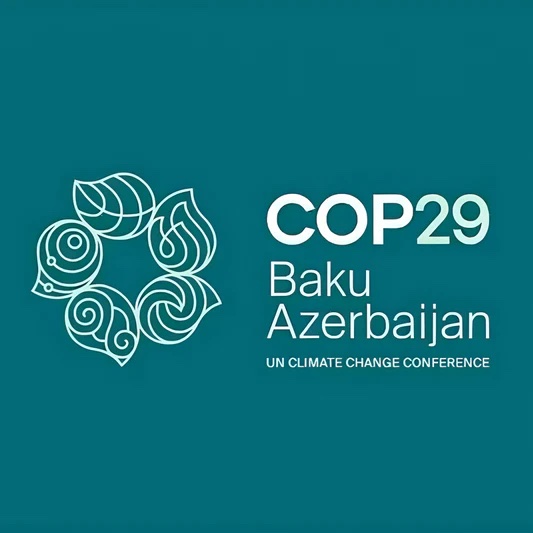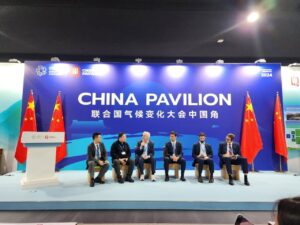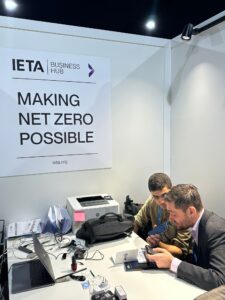COP29 update: Day 4, 14 November

Greetings from Baku!
How’s this for a metaphor? The Earth Negotiations Bulletin, the IISD-run reporting effort that covers climate and environmental negotiations year-round, has thrown up its hands in despair in its search for a decent cup of coffee here in Baku. Here’s the relevant snippet from the “In the Corridors” section of yesterday’s report:
“A major debate in the corridors, on the floors, was the quality of the various coffee options. Like the negotiations at this stage, there was no resolution.”
That’s obviously a reference to the technical discussions over the New Collective Quantified Goal on climate finance, where there seems to have been very little progress, chiefly because of the sizeable gulf in expectations of developing country recipients and developed country donors.
Not only are there disagreements on the sum, but there are diverging views on proposals to widen the range of donor countries beyond the traditional UNFCCC Annex II list of developed countries. These suggestions are being stoutly resisted by those emerging economies that you’d expect would be added to the list: China, some of the Middle East, etc.
Instead, as an example, China is floating the idea of making voluntary and non-binding funding, and casting that as South-South cooperation rather than any formal commitment.
After negotiators told the co-facilitators to trim down the 34-page draft negotiating text yesterday – while retaining the range of options put forward by Parties – the group reconvened today to consider a thinner document, this time just 33 pages long.
More on the progress of this headline item tomorrow.
And because this first Thursday of COP was also Finance Day, it was the perfect moment for the UN’s Independent High-Level Expert Group on Climate Finance to publish its third report on climate finance.
The study, led by Nicholas Stern, concluded that global climate action needs between $6.3 and $6.7 trillion a year by 2030, with $2.4 trillion a year needed specifically for emerging economies. They broke it down further:
Excluding China, the panel said the developing world needs $1.6 trillion for clean energy, $250 million for climate adaptation, $250 million for loss and damage, $300 million for sustainable agriculture and natural capital, and $40 million for fostering a just transition.
The experts said the funding needs to be raised through combination of measures including a tripling of multilateral development bank lending, a doubling in bilateral donor support, $200 billion in unconventional sources such as levies for shipping, aviation and carbon markets. The rest would come from private sector mobilisation, they added.
And there were also hopes that Parties might use Finance Day to come forward with firm commitments. But as far as we could tell, it was only Sweden that made a pledge, promising SEK 8 billion ($763 million) to the Green Climate Fund and SEK 200 million ($18.1 million) to the new Loss and Damage Fund that was operationalised only last year.
Elsewhere, and of particular interest to IETA members, IOSCO published its Final Report on the Voluntary Carbon Markets which describes the landscape of the VCM and proposes a code of Good Practice that is aimed at regulators, trading venues and market participants.

Our CEO Dirk Forrister joined speakers including IETA’s former international policy director Stefano De Clara for an event at China’s pavilion.
In the negotiations
That ENB coffee/negotiations metaphor could also have applied to Article 6 talks today.
Early in the afternoon, the SBSTA published draft decision text on “further guidance on the rules, modalities and procedures” for Article 6.4. This was accompanied by a draft decision text on 6.4 for the CMA, which contained placeholders for all the items being discussed under SBSTA.
A new Article 6.2 text was also produced – the first since Bonn.
However, Parties, as well as our own team, had precious little time to review any of the updated documents before the 6.4 contact group met at 1700 AZT. In fact, this session was almost immediately adjourned after Parties complained they had not had time to review the text.
A couple of hours later the 6.2 group convened to go through all 43 pages of the new version, and it was immediately apparent that Parties were not happy with some of the drafting work; in at least one case amendments were missing after emails bounced back from the UNFCCC.
SBSTA chair Harry Vreuls of the Netherlands warned Parties that things were not going in the right direction and that the text was getting too long. He urged Parties to work overnight on substantive issues rather than “ands” and the “ors”.
If the overnight talks went well, Vreuls told the room, he would publish a text tomorrow at noon and convene the heads of delegations on Friday afternoon. He said he is “sorry for this mode of work”.
Unfortunately, the meeting broke up after just over an hour, with no indication when talks will resume. Our observers said it looked “very challenging” to bridge and resolve issues overnight,
Delegates had discussed adding a section containing elements that the Initial Report should include. The Like-Minded Developing Countries and the Arab Group said that was unacceptable and beyond the group’s mandate. The EU said this section is needed to ensure “upfront transparency” so that Parties can be more flexible on sequencing and consequences for Parties with inconsistent reports.
The co-facilitators, Peer Stiansen from Norway and Maria AlJishi from Saudi Arabia, will submit a clean text to the SBSTA chair without further consultations.
Elsewhere, for those of a nostalgic temperament, the SBSTA also published a fairly short draft decision text on matters relating to the operation of the clean development mechanism, which dealt largely with financial considerations. The text offered one option recommending the CMP adopt a draft decision, and another leaving any decision up to the CMP.

Andrea Bonzanni presented a live update on the state of Article 6 talks for listeners to Morocco’s leading business radio station from the IETA Business Hub office.
Thursday at the IETA Business Hub
After a hectic and crowded Wednesday at the Business Hub, Thursday proved to be just as active. As well as moderating and speaking at side events at our own pavilion, IETA staff have travelled far and wide already at COP and beyond in their engagement with our partners and Parties.
Dirk has joined panel discussions at both Singapore’s and China’s pavilions and was a participant in the launch event today of the World Bank’s Multilateral Investment Guarantee Agency.
Bjorn joined an event on ASEAN carbon project finance at Malaysia’s pavilion, while Katie Sullivan spoke in an event on Alberta carbon market leadership at the Canada pavilion.
Pedro Venzon participated in an event at Oman’s pavilion highlighting the country’s Article 6 plans, while Luis Panichelli is scheduled to participate in a side-event with EKI and CAR on carbon credit use to achieve net zero, as well as at a UN REDD+ event later in the week.
And away from the COP, our team was also busy spreading the word about the CMA approval of the Article 6.4 Supervisory Body’s rules on methodologies and removals. Our Latin American lead Camilo Trujillo spoke on France 24’s Spanish-language service to explain the developments in Baku, and Andrea Bonzanni was interviewed today live on Moroccan business radio, giving the listeners an update on the progress of Article 6.
IETA was also involved in some excellent new papers published today. Our nature-based solutions team wrote Financing REDD+ under the Paris Agreement, in which they examine the landscape for REDD+ and how it might evolve.
A second paper, published by ICAO and endorsed by IETA, is a comprehensive overview of CORSIA emissions unit criteria and an explanation of the requirements for corresponding adjustments to guarantee the environmental integrity of CORSIA-eligible emissions units.
Friday at the IETA Business Hub
Many of the events hosted at the IETA Business Hub will be webcast – just click on the links to participate! All event times are listed in Azerbaijan time (AZT), which is three hours ahead of Central European and four hours behind Singapore time.
IETA’s BusinessHub is located in Area E, Pavilion H6 in the Blue Zone. We’re close to the pavilions of Georgia, Moana Blue Pacific alliance and Namibia.
Before we launch into the day’s side event schedule on Friday, IETA will hold a media briefing at 0800 AZT. Our CEO will give an update on the state of the negotiations to reporters, with particular emphasis on the Article 6 work stream. We’ll bring you any additional views from this in tomorrow’s edition.
Our side event programme opens at 1000 AZT (0700 CET) with a session organised by 1 Point 5, who will address the key role direct air capture at scale plays in decarbonisation strategies for hard to abate sectors. The panel will share latest updates on the development of the largest DAC plant to date – Stratos. You can join this session online here.
At 1130 AZT, IETA and Conservation International will host a joint session, involving public and private sector leaders and non-state actors, to explore the future of high-integrity carbon markets and their role in driving climate action. We’ll discuss how ambitious climate goals, investor confidence, evolving policy frameworks, and impactful partnerships are shaping compliance and voluntary markets while ensuring their benefits for people and the planet. Virtual participants can watch this session here.
The afternoon schedule starts at 1300 AZT with an event organised by University of Maryland and Landscape Indonesia. A panel will discuss how the carbon market can help finance the early retirement of coal-fired power plants by replacing them with renewables. Virtual participants can join the event here.
1 Point 5 will return to the Business Hub at 1430 AZT to host a session on carbon dioxide removal: how to implement CDR within corporate net-zero strategies. Speakers will address driving transparency and partnership between global organisations committed to net zero, and deepening the understanding of ESG regulation that will impact private organisations pre-2030. Join the conversation here.
At 1600 AZT, organisers CarbonAi and Zefiro will present an event on scaling large-scale methane mitigation through market-based approaches. Virtual attendees can join here.